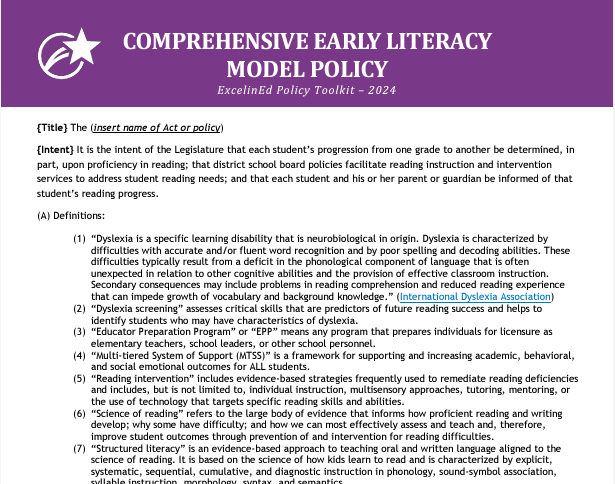
The Solution:
Instruction, Policy, & Investment
By adopting and funding proven, evidence-based policies statewide, Pennsylvania has the opportunity to build a future where every child has the literacy skills needed to thrive.
Evidence-Based Instruction
Through decades of conclusive, empirically supported scientific research, we now know that the human brain is not inherently wired for reading; it requires explicit instruction to develop this skill.
You’ve likely heard of the science of reading (SoR), but it’s far from a pendulum swing in the so-called “Reading Wars.” The science of reading represents everything scientifically known about how people learn to read and how best to teach it. Informed by neuroscience, SoR reveals that reading is a complex skill involving multiple regions of the brain.
Unlike spoken language, which children often absorb through exposure, learning to read and write requires structured, explicit instruction. This instruction develops critical neural pathways that connect sounds to visual symbols, enabling the process of reading itself.
Explicit instruction grounded in SoR, known as Structured Literacy, systematically teaches the five essential components of literacy: phonemic awareness, phonics, fluency, vocabulary, and comprehension. These foundational skills support essential brain development for reading and eliminate the need for guesswork. Instead, children gain the tools they need to decode and understand text, making reading an accessible and achievable skill.
Research suggests that with this structured approach to reading instruction, more than 90% of students would learn to read (Torgesen, 2004).
While legislative champions in Harrisburg have spurred policy progress, there is still a long way to go in addressing our literacy crisis. Pennsylvania still lacks a cohesive policy framework that mandates or funds the training, resources, and support educators need to provide evidence-based reading instruction in every classroom. Of the 33 teacher preparation programs in Pennsylvania evaluated by the National Council on Teacher Quality, only 18% of programs adequately cover all five components of the science of reading (NCTQ, 2023). Comprehensive policy reforms that address these needs are essential to addressing the literacy crisis and preparing our students for lifelong learning and success.
Key considerations in addressing this crisis via policy include a clear commitment to and substantial investment in ongoing:
Educator training
Classroom-embedded literacy coaching
Curricula aligned with the evidence
An informed, evidence-based approach to literacy policy will not only empower educators and improve student outcomes but will also contribute to broader social and economic gains, enhancing the state's workforce readiness and reducing disparities in health and employment outcomes. Investing in comprehensive literacy policy is not just about addressing an educational gap—it’s about ensuring a future where every Pennsylvanian has the opportunity to thrive.
Evidence-Based Policy
Spotlight on Mississippi
Mississippi serves as a powerful model through its transformative literacy policies—often referred to as the "Mississippi Miracle"—which include mandated teacher training in evidence-based instruction, coaching support, and a focus on early interventions. This state-led initiative has significantly improved student literacy rates and illustrates the potential impact of well-funded and well-implemented policies. In 2013, the Mississippi legislature passed the Literacy-Based Promotion Act, which was followed by dramatic gains in the state’s reading proficiency and serves as a model for other states such as Florida and Tennessee.
For model literacy policies and other resources, visit earlyliteracymatters.org
Investing in Evidence-Based Instruction: Building a Prosperous Future for Pennsylvania
The Pennsylvania Literacy Coalition was established in 2025 in response to the growing literacy crisis in our state. While many of our member organizations have long advocated for better literacy policies, we recognized that a united, coordinated effort is essential to achieving meaningful, lasting change. Inspired by other states that have transformed their literacy outcomes through strong policy, we are committed to advocating for a comprehensive, statewide approach tailored to Pennsylvania's unique needs and challenges.
Specifically, we are advocating for a $100 million investment from the Pennsylvania General Assembly to improve literacy outcomes across the state. This funding would be allocated toward (1) comprehensive educator training and coaching in the science of reading, (2) the distribution of curricula aligned with evidence-based practices, and (3) the implementation of screeners and intervention programs for struggling readers. States like Mississippi and Louisiana have demonstrated how a targeted financial investment in these areas can lead to dramatic improvements in reading outcomes for all students, setting the foundation for a prosperous future. By prioritizing evidence-based instruction and policies, we can ensure that every student in Pennsylvania has the opportunity to become a skilled reader, prepared to succeed in school, work, and life.






